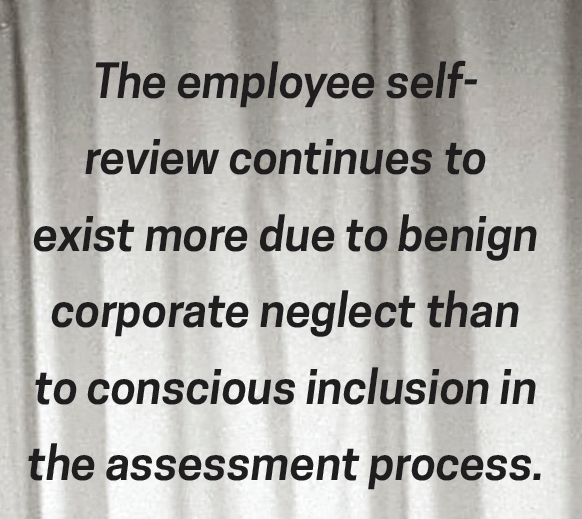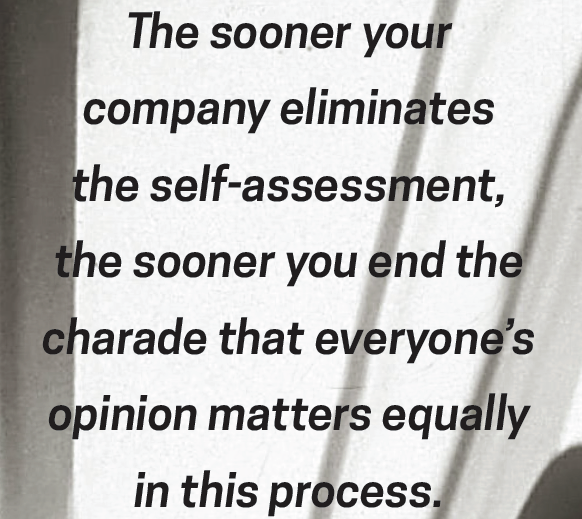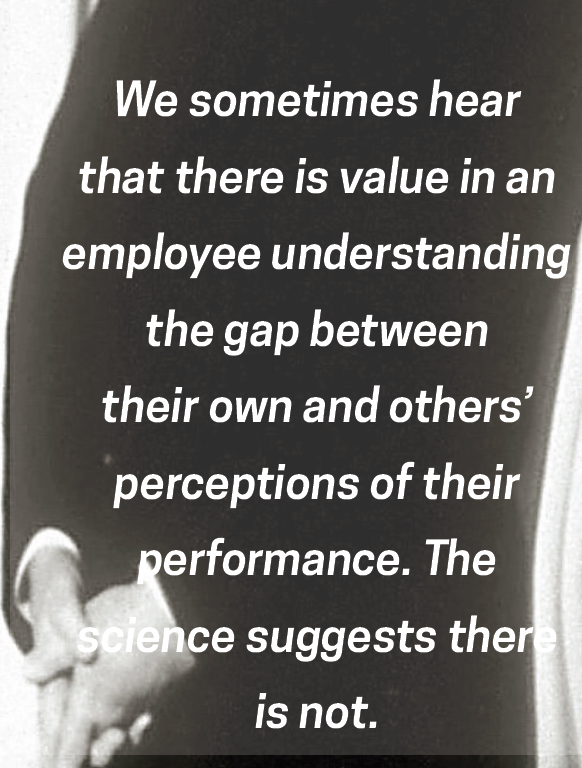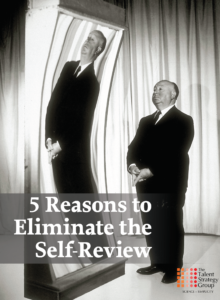5 Reasons to Eliminate the Self-Review

By Marc Effron, President, Talent Strategy Group
As companies worldwide strive to optimize performance management, they often overlook a change that would simplify the process, build trust and increase accountability. They can eliminate the self-review.
The employee self-review continues to exist more due to benign corporate neglect than to conscious inclusion in the assessment process. Its presence can introduce bias, give cover to poor managers and create unrealistic expectations in employees.
Why You Should Eliminate Self-Reviews
The logic behind asking employees to assess their performance and behaviors seems direct and compelling. They are the key party being discussed, they are closest to the work and behaviors being evaluated and they have the most to gain or lose from the outcome. Plus, if the manager’s assessment differs from the employee’s assessment, it provides a great opportunity to clarify why those gaps exist.
That simple logic leads millions of employees to annually write the assessment equivalent of War and Peace,1 arguing their strongest case for why they had a great year while wasting millions of potentially productive work hours. In most companies, the time and emotion invested by employees in those reviews sadly doesn’t matter.
The logic to eliminate reviews is far more compelling and has strong science to support it, starting with these five points:
Point 1: Employees mistakenly believe that their input counts.
If you ask an employee to assess themself, they understandably believe that their input will influence the review’s outcome. If that wasn’t true, asking them to write a self-review would be disingenuous, even mean-spirited.
In most organizations, however, the most consequential outcome of a review – the rating and/or compensation recommendation – is decided by the individual’s manager long before the employee submits their self-review. The year-end compensation processes or rating calibration processes drives that initial rating, independent of the employee’s voice.
Our experience is that few companies are transparent with employees about this reality. Rather, they pretend that the employee has influence through the review when they clearly do not.
If you choose to keep self-reviews after reading this article, we recommend that you be transparent with your employees about the true consequence of their efforts. Which leads to point #2:

Point 2: It’s a review, not a debate.
The purpose of a performance review is for a manager to assess their employee’s performance against a set of goals and behaviors. Asking employees to submit an assessment of their own performance reinforces the mistaken belief this is a negotiation or that they have a vote in the outcome.
If asked to complete a self-review, an employee will understandably feel that this presents a legitimate opportunity for debate. They will spend significant time preparing their case – writing in detail about their accomplishments, behaviors and the challenges they’ve overcome. They’ll feel fully prepared for a robust discussion on review day, expecting that their manager will present their case, the employee will present their defense and the two parties will come to a mutually satisfactory decision.

Employees need to understand that it’s their manager’s responsibility to gather relevant information about the employee’s performance and behaviors and to summarize that data into a review. The sooner your company eliminates the self-assessment, the sooner you end the charade that everyone’s opinion matters equally in this process.
Why isn’t the employee’s assessment a legitimate input to the decision? Because . . .
Point 3: It’s incredibly biased.
The self-review invites bias into the review process in three different ways. First, we know that personality factors influence our willingness to self-promote our capabilities and accomplishments.2 Extroverted employees are more likely than less extroverted ones to self-promote in their reviews. Gender-bias plays a role here as well since science shows that men are far more likely to over-rate their performance than women.3 So, extroverted men now have a natural advantage if self-reviews influence evaluations.
Second, bias can emerge where native speakers of your language have an advantage over non-native speakers. Employees with the same mother tongue as their manager are far more likely to be able to craft a phrase or make a point using words and nomenclature that resonate with their manager.
The third way that bias creeps into a self-review is that self-assessors who are more skilled in writing a persuasive argument have an advantage over those who are less effective. The former may write a self-review that’s the equivalent of a slick infomercial while the latter pens something that reads like the owner’s manual to your car.
In fact, the potential for bias in self-reviews is so overwhelming that this factor alone should be sufficient reason for you to eliminate if from your company’s process.
Point 4: Employees are the least accurate observers.
The science is clear that self-assessments are typically inaccurate, with lower performing employees over-rating themselves and the very highest-performing employees under-rating themselves. This means that everyone who works with the employee from their manager to their direct reports to their peers is likely to be a more accurate assessor of their accomplishments.4,5
This begs the question of why we would ask the least accurate observer of an event for their observation? This would set up a conversation that is contentious by definition, with an employee who earnestly believes their assessment is correct arguing against the collective perceptions of more accurate observers.

We sometimes hear that there is value in an employee understanding the gap between their own and others’ perceptions of their performance. The science suggests there is not. Rather, there’s is anger, defensiveness and reduced striving to perform in the future.6 The employee may better understand their managers’ perceptions after that discussion, but they will still anchor to their well-crafted self-beliefs.
Point 5: They enable lazy managers.
As we redesign performance management for our clients, managers sometimes explain that they appreciate employee self-assessments since they highlight accomplishments that the manager might not otherwise remember.
Those managers might as well say to us, “I’m not able to perform my managerial responsibilities, so I rely on my direct reports to do my job for me.” Sound a little harsh?
A people manager must set clear goals, coach their team and review performance. If they are unable to recall their team member’s performance and behaviors, one of a few things may have gone wrong. First, they did not set clear goals. The manager is unable to review accomplishments because there are no objectives to review against.
Second, they may not have been coaching and giving feedback during the year. If they had been regularly coaching their employees, they would have had many opportunities to observe and discuss the employee’s performance and behavior with them.
Third, and we find this to be rare, a manager may simply have so many direct reports that it is literally impossible for them to individually track their performance and behaviors. We occasionally see this in positions like nurse manager, where an individual may have 100 nurses in their charge. Even in cases like that, it is possible to build in a span breaker who can take on the reviewer role with a more reasonable span of control.
None of these situations are a reason to rely on employees’ self-reviews for input to the conversation. They are a reason to upskill your people managers and hold them accountable to do their job.
What to do instead
The science suggests, and we strongly endorse, that employees must have a “voice” in the process to consider it fair and legitimate. For this reason, they should be encouraged to fully participate in the review discussion with transparency about its purpose.
If you choose to use self-reviews, employees should understand that their self-assessment is not an input to the review process, or the decisions being made in it. It is essentially an on-line summary of remarks they feel compelled to have “on the record.” Once they have this understanding, we are confident that the vast majority of them will opt-out of self-reviews if they are not required to participate.
There are enough difficult decisions to make when redesigning your company’s approach to managing performance. It should be an easy choice to eliminate the least objective, most bias-inducing and trust-destroying part of the process. Give your employees a voice in their reviews but stop pretending that they have a vote.
Endnotes:
1 https://en.wikipedia.org/wiki/War_and_Peace#:~:text=
The%20novel%20chronicles%20the%20French,of%20five%20Russian%20aristocratic%20families.&text=
Tolstoy%20said%20War%20and%20Peace,still%20less%20a%20historical%20chronicle.%22
2 Hu, Jia, Zhen Zhang, Kaifeng Jiang, and Wansi Chen. “Getting ahead, getting along, and getting prosocial: Examining extraversion facets, peer reactions, and leadership emergence.” Journal of Applied Psychology 104, no. 11 (2019): 1369.
3 Paustian-Underdahl, Samantha C., Lisa Slattery Walker, and David J. Woehr. “Gender and perceptions of leadership effectiveness: A meta-analysis of contextual moderators.” Journal of Applied Psychology 99, no. 6 (2014): 1129.
4 Dunning, David, Chip Heath, and Jerry M. Suls. “Flawed self-assessment: Implications for health, education, and the workplace.” Psychological Science in the Public Interest 5, no. 3 (2004): 69-106.
5 Sedikides, C., & Strube, M. J. (1997). Self evaluation: To thine own self be good, to thine own self be sure, to thine own self be true, and to thine own self be better. In M. P. Zanna (Ed.), Advances in experimental social psychology, Vol. 29 (p. 209–269). Academic Press
6 Ilies, Remus, and Timothy A. Judge. “Goal regulation across time: the effects of feedback and affect.” Journal of Applied Psychology 90, no. 3 (2005): 453.
More About The Author:
- Marc Effron, President, Talent Strategy Group
- Marc founded and leads The Talent Strategy Group and consults globally to the world’s largest and most successful corporations. He co-founded the Talent Management Institute and created and publishes TalentQ magazine. He co-authored the Harvard Business Review Publishing best-seller One Page Talent Management and 8 Steps to High Performance.
